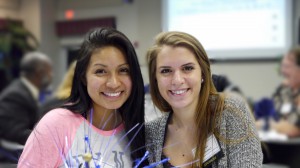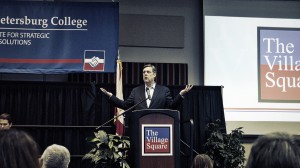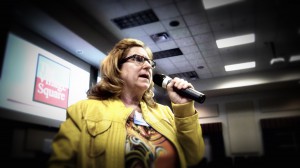
All Bets are Off at Casino Gambling Forum
SPC Programs & Events February 22, 2015The debate on gambling in Florida came to St. Petersburg College Seminole campus on January 28th at the Institute for Strategic Policy Solutions Village Square program. On stage were Institute for American Values president David Blankenhorn and gaming industry lobbyist Nick Larossi to discuss the issue.
The gambling debate has a history in Florida dating back to St. Augustine in 1888. Since then Florida has opened its doors to gambling on a limited scale. Horse and dog tracks are legal with a permit, and the state sold its first lottery ticket in 1988. Voters rejected attempts to legalize casinos in 1986 and 1994. In 2010 Governor Crist signed the Seminole compact giving the Florida Seminole tribe exclusive casino gambling rights in the state in exchange for a share of the revenue. At the end of July the Seminole compact expires. If it is not renewed the tribe will no longer be able to run casinos. Should the compact be renewed? If so under what terms?
After a brief introduction by campus provost Dr. James Olliver, the moderator Dr. Susan Demers, the dean of St. Petersburg College’s Policy Ethics and Legal Studies college, took the floor. Demers gave an overview of the issue and introduced David Blankenhorn and Nick Larossi. A poll was conducted asking if Florida should allow Las Vegas style casinos. The majority of those that responded favored casinos in Florida, 52 percent to 30 percent against with 17 percent undecided with 23 members of the audience responding. After the poll closed, Larossi began his opening statement.
“We are a significant gaming state,” said Larossi. Florida currently has tribal casinos in six cities, 27 pari-mutuels which include horse racing, dog racing, and jai lai. “Don’t think casinos on every corner, because no one is proposing that. Quite frankly, what most folks are just proposing is give an opportunity to competitively bid for a limited number of facilities in the state, and allow the local governments, allow the constituents of those cities to decide whether they want it,” said Larossi.
“I am not against gambling,” said Blankenhorn, “if you want to bet on who’s going to win the Super Bowl on Sunday . . . private recreational gambling is not what I am here to be against.” He believes these agreements between government and casinos profit from those who can least afford to lose, the poor and persons with gambling addictions. “I don’t think it even deserves to be called gambling, since you know the games are rigged,” said Blankenhorn. He told the audience that economists who have studied the issue have found that casinos remove value from local economies. Blankenhorn closed by saying, “casinos are for states that don’t have any better ideas,” citing his experience growing up in Mississippi, and the wave of casino closures in Atlantic City as the long term outcomes of embracing gambling.
After opening statements Dr. Dermer polled the audience again asking, “If the legislature does decide to expand casino gambling, which option do you prefer?” The audience responded favoring destination-resorts by a wide margin at 67 percent, 26 percent favored no casinos, and 7 percent wanted casinos anywhere there is a market. The poll had 27 responses.

SPC students Lisa Marcos, Jenna Magnano.
gambling. SPC students Jenna Magnano, and Lisa Marcos were skeptical of the benefits of expanded gambling, as was Michael Bakewell, who said he was not comfortable with risk. Patricia Plantamura, a member of the Seminole City Council was also against expanded gambling in Florida. The sole vote in favor was SPC student Madison Bommlelare, who thought that casinos would be an interesting place to meet up with friends. After the discussion there was a brief question and comment period. Among the commenters was Marcy Nichols, a gambling addiction therapist, who feels that Florida does not work to help problem gamblers today, and is worried about an expansion of gambling in the future.
In closing remarks Larossi directed audience members to the Spectrum report from the Florida legislature, eliciting laughter when he said “it is unbiased, it is done by the Florida legislature.” He continued “if done correctly, with the right type of model, Florida can benefit dramatically from it. It can be done in a safe, effective way, where adults can go entertain themselves. And all the ills associated with the scare tactics provided by folks who are opposed to casino gaming, these studies here, which are all cited, show that it is just not true.”
Blankenhorn began his closing statement by saying that independent studies support that gambling does not promote growth. This led to a short on stage argument between Blankenhorn and Iarossi, in which both accused the other’s studies of being biased. Blankenhorn said, “I don’t stand to make money by having or not having casinos, whereas your employers stand to make billions by having casinos.” He urged the audience not to base their decision on studies that predict future events like the Spectrum report, but to look at studies of the effects of gambling on communities. Blankenhorn directed members of the audience to a booklet he brought to the forum, which can be downloaded here. In his final words Blankenhorn said, “Do we American people want our government to raise a substantial potion of its revenue in this way? . . . I don’t believe that essentially cheating unwary people of lower income out of billions of their dollars to pay for our services, and that’s what we’re doing, I don’t believe that is an ethically wise way for government to operate.”








